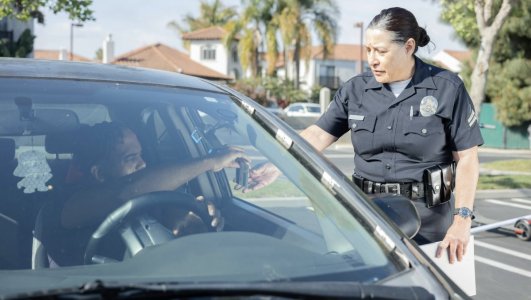Drivers win legal right to make this bold gesture under constitutional protection
- Replies 0
It may sound shocking, but a court decision has confirmed that what many would consider an insulting gesture toward law enforcement is actually protected speech.
The ruling came after a long legal battle involving a traffic stop, a ticket, and a driver’s defiant reaction.
While many see the act as rude, the law now sees it as an expression of constitutional rights.
This unusual outcome is sparking debate across the country about how far free speech protections can go.
The controversy traces back to a woman in Michigan who was stopped during a routine traffic check in 2017.
After receiving what she thought was an unfair citation, she responded by raising her middle finger at the officer.
The officer reacted by pulling her over again and upgrading her violation to a speeding ticket.
That second stop set off a legal battle that would climb through the courts for years.
The driver argued that her rights were violated on multiple levels:
Also read: These everyday habits seem harmless—but experts say they can be surprisingly dangerous
Circuit Judge Jeffrey Sutton acknowledged the gesture might not follow the Golden Rule of treating others kindly.
But he stressed that, in the eyes of the law, offensive expression is still protected expression.
His ruling in 2019 declared: “Any reasonable officer would know that a citizen who raises her middle finger engages in speech protected by the First Amendment.”
The outcome means motorists cannot be punished simply for insulting an officer with words or gestures.
Also read: These states are quietly leading the way in road quality
While it may not win anyone points for politeness, it reinforces that officers cannot escalate a traffic stop solely because of a citizen’s rudeness.
The decision also highlights the fine balance between maintaining respect on the road and protecting individual freedoms.
The ACLU of Oklahoma has reminded the public of their rights during police encounters. According to their guide:
The case is a reminder that while respect may smooth interactions, rights remain intact even when tempers flare.
Read next: This Christmas song could be behind road accidents—find out which one!

Would you ever risk using such a gesture toward an officer? Do you think this ruling goes too far in protecting rudeness, or is it an important safeguard for free speech? Have you ever had an experience where knowing your rights made a difference during a traffic stop? Drop your thoughts and stories in the comments—your voice matters.
The ruling came after a long legal battle involving a traffic stop, a ticket, and a driver’s defiant reaction.
While many see the act as rude, the law now sees it as an expression of constitutional rights.
This unusual outcome is sparking debate across the country about how far free speech protections can go.
The controversy traces back to a woman in Michigan who was stopped during a routine traffic check in 2017.
After receiving what she thought was an unfair citation, she responded by raising her middle finger at the officer.
The officer reacted by pulling her over again and upgrading her violation to a speeding ticket.
That second stop set off a legal battle that would climb through the courts for years.
The driver argued that her rights were violated on multiple levels:
- Her First Amendment right to free speech
- Her Fourth Amendment protection against unlawful seizure
- And her 14th Amendment right to due process
Also read: These everyday habits seem harmless—but experts say they can be surprisingly dangerous
Circuit Judge Jeffrey Sutton acknowledged the gesture might not follow the Golden Rule of treating others kindly.
But he stressed that, in the eyes of the law, offensive expression is still protected expression.
His ruling in 2019 declared: “Any reasonable officer would know that a citizen who raises her middle finger engages in speech protected by the First Amendment.”
The outcome means motorists cannot be punished simply for insulting an officer with words or gestures.
Also read: These states are quietly leading the way in road quality
While it may not win anyone points for politeness, it reinforces that officers cannot escalate a traffic stop solely because of a citizen’s rudeness.
The decision also highlights the fine balance between maintaining respect on the road and protecting individual freedoms.
The ACLU of Oklahoma has reminded the public of their rights during police encounters. According to their guide:
- You can remain silent and request a lawyer immediately.
- You do not need to consent to searches, though police may conduct a pat-down if they suspect a weapon.
- You are not required to answer questions about citizenship or immigration status.
- If arrested, you have the right to a local phone call, and police cannot listen if you call an attorney.
The case is a reminder that while respect may smooth interactions, rights remain intact even when tempers flare.
Read next: This Christmas song could be behind road accidents—find out which one!
Key Takeaways
- A Michigan woman sued after receiving a harsher ticket when she flipped off an officer in 2017.
- The Sixth Circuit Court of Appeals ruled in 2019 that the gesture was protected under the First Amendment.
- The driver also argued her Fourth and 14th Amendment rights were violated during the second stop.
- The ACLU of Oklahoma reminds citizens of their rights during police encounters, including the right to silence, legal counsel, and protection from unlawful searches.







